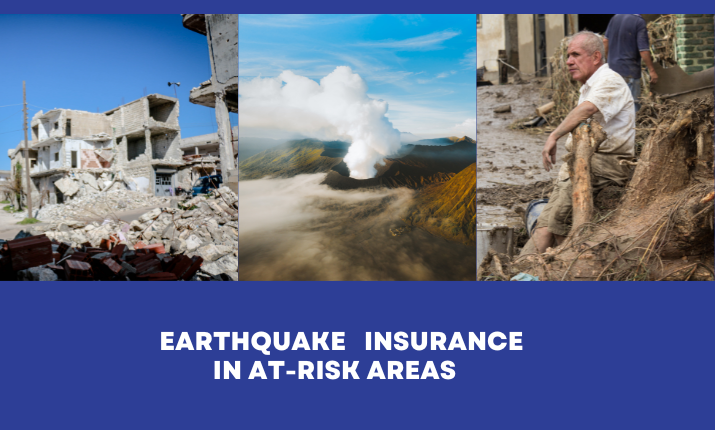Introduction
Home and possession protection in earthquake-prone regions is of utmost importance since earthquakes can strike without warning, leaving families to repair the damage done to them and rebuild their lives from scratch. That’s where earthquake insurance steps in: it offers financial support to help mitigate costs in such an unforeseen event.
Earthquake Insurance Cover
Earthquake insurance typically covers damage to your home and personal possessions caused by earthquake-related destruction and additional living expenses, if necessary, due to relocation caused by such disaster. Therefore, you must review your policy thoroughly to understand the full scope of coverage before purchasing one.
Understanding Earthquake Risk Factors
Locating Vulnerable Areas
Certain parts of the world are more vulnerable to earthquakes due to their proximity to tectonic plate boundaries. For instance, coastline areas along the Pacific Ring of Fire face increased seismic risks, while some parts of California, Japan, and Turkey have long been recognized as seismological hotspots.
Studying historical seismic data provides invaluable insight into the frequency and intensity of earthquakes in specific locations. This data can help evaluate risk and select suitable insurance coverage.
Exclusions and Additional Coverage
It would be best to discuss exclusions with your insurance provider, as some policies have them. Furthermore, additional coverage could be purchased for high-value items like collectibles, jewelry, or electronics.
Assess Your Risk and Coverage Needs
Engaging in Professional Services
Consultation with professional insurance agents or geologists can offer invaluable insights into the specific risks affecting your location and assist with determining suitable coverage levels for your situation.
Conducting a Home Risk Analysis
Assessing your home’s structural integrity is key to understanding its susceptibility to seismic activity, and strengthening any weak points can reduce potential damages significantly.
Mitigation and Preparedness Measures
Securing Heavy Items: Preventive measures like securing heavy furniture and appliances can help lower the risk of injury and property damage during an earthquake.
Emergency Kits and Communication Plans
Preparing for an earthquake is wise by stockpiling essential supplies in emergency kits and creating an action plan with family members if an event threatens their well-being.
Factors Influencing Earthquake Insurance
Multiple variables impact the cost of earthquake insurance premiums, including your location, age, home construction materials, and the chosen coverage level. Premiums may vary significantly based on these considerations.
Consider the Benefits and Costs
Although earthquake insurance comes at a price, its potential financial protection in disaster often outweighs its costs.
Explore Policy Options
There are various policy options for earthquake insurance available to you, so understanding their nuances will enable you to make an informed decision.
Coverage Limits and Deductibles for Coverage.
Deductible Levels
Earthquake insurance policies often come with a deductible amount you’re responsible for paying before your coverage takes effect. Higher deductibles often lead to lower premiums; it is, however, essential to select the one you can comfortably afford should an emergency require filing a claim.
Coverage Limits
Policies contain coverage limits that indicate how much of a claim payment the insurance company will cover. It is wise to assess these limits closely so they align with your anticipated costs of rebuilding or repairing your home.
Retrofitting and Discounts
Retrofitting for Premium Reductions
Many insurance companies provide discounts to homeowners who take steps to retrofit their homes against earthquakes by bolting them securely to its foundation, reinforcing cripple walls, and protecting water heaters. These actions could include running the house down securely onto its foundation and supporting cripple walls, bolting water heaters securely, or bolting down furniture such as bookcases to their foundation.
Additional Discounts and Bundling Options
Additional discounts can be secured by bundling earthquake coverage with other policies, such as homeowners or auto. It’s worth exploring this route to maximize savings.
Navigating the Claims Process Should an earthquake strike, understanding the claims process is essential to ensure an efficient recovery process.
Documenting Damage
Take photographs and videos of all damages to your property as evidence for filing a claim. Having visual evidence will assist with making claims easier and will also provide better settlement offers when filing lawsuits against insurance.
Contacting Your Insurance Provider
Prompt Notification
Notify your insurer as soon as it is safe for you to do so, and they will guide you through the necessary steps to initiate the claims process.
Working With Adjusters
An insurance adjuster will be assigned to assess the extent of the damage. Ensure all relevant documentation is given during their assessment to allow them to address questions or voice concerns during this step.
Conclusion
Investing in earthquake insurance is an intelligent choice for homeowners in areas susceptible to earthquakes. Knowing your risks, evaluating coverage needs, and taking preventative steps could make a substantial difference when faced with seismic events.
FAQs
Are earthquake insurance policies typically required in high-risk areas?
Earthquake coverage is generally not mandatory, though it should be strongly considered in areas prone to seismic activity.
Can I purchase earthquake insurance for a rental property?
Landlords can secure their rental properties with earthquake coverage by buying earthquake insurance policies.
What is the waiting period for earthquake insurance coverage?
Waiting times vary according to policy type but typically take approximately 15 days from the date of purchase.
Do earthquake insurance policies cover tsunami-related damages?
No. Most standard earthquake policies do not cover tsunami damages.
Can retrofitting my home help lower my earthquake insurance premiums?
Yes, strengthening the structural integrity of your home may reduce earthquake insurance premiums.

